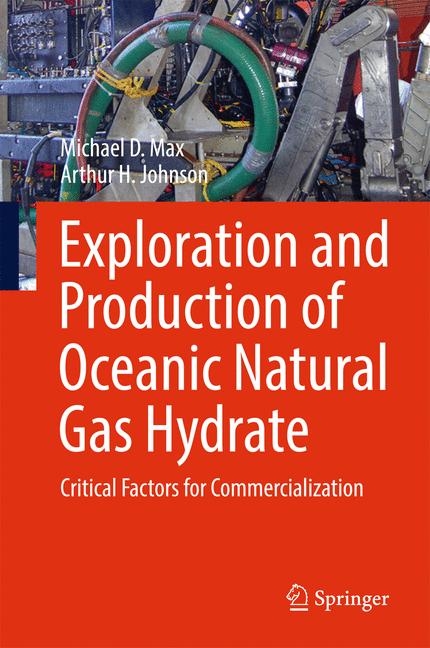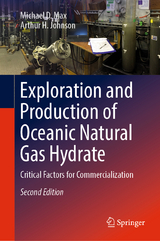
Exploration and Production of Oceanic Natural Gas Hydrate
Springer International Publishing (Verlag)
978-3-319-43384-4 (ISBN)
- Titel erscheint in neuer Auflage
- Artikel merken
This is possibly the most useful book discussing fossil fuels that will be a reference for environmentalists and energy policy institutions, and for the environmental and energy community.
Michael Max has a broad background including geology, geophysics, chemistry, acoustics, and information technology. Max has a BSc (History, Geology) from the University of Wisconsin, Madison, an MSc (Petroleum & Economic Geology) from the University of Wyoming, and a PhD (Geology) from Trinity College, Dublin, Ireland. He has worked as a geologist / geophysicist for the Geological Survey of Ireland, the Naval Research Laboratory, Washington, DC in shallow water acoustic propagation prediction, and the NATO Undersea Research Center, La Spezia, Italy in at-sea experiments and operational technology applications. From 1999 to 2011 Max was CEO and Head of Research for Marine Desalination Systems LLC, which established a hydrate research laboratory and explored industrial applications of hydrate chemistry. He has been an author on many scientific publications and three textbooks and over 40 patents and patent applications. He assisted in the writing of the U.S. Gas Hydrate Research and Development Act of 2000. Michael was appointed by the Secretary of Energy to the Methane Hydrate Advisory Committee of the Department of Energy for 2014--2017, and is Co-Chair, Diving Committee of the Marine Technology Society. He has been a principal of HEI since 2001 and is also an Adjunct Professor in the School of Geological Sciences of University College, Dublin, Ireland. Max is a member of the Geological Society of America, Geological Society of London, American Geophysical Union, American Chemical Society, Explorers Club, Coast Guard Auxiliary, Acoustical Society of America, and American Association for the Advancement of Science, amongst others. Arthur H. Johnson is a founding partner of Hydrate Energy International, LLC (HEI) and is engaged in energy consulting in the U.S. and throughout the world. Prior to forming HEI in 2002, Art was a geologist with Chevron for 25 years where his career included most aspects of hydrocarbon exploration and development. Art was instrumental in initiating Chevron's Gulf of Mexico program for gas hydrate studies in 1995. He has advised Congress and the White House on energy issues since 1997, and chaired advisory committees for several Secretaries on Energy. He has an on-going role coordinating the research efforts of industry, universities, and government agencies. Art served as the Gas Hydrate Lead Analyst for the "Global Energy Assessment", an international project undertaken by the International Institute for Applied Systems Analysis (IIASA) of Vienna, Austria and supported by the World Bank, UN organizations, and national governments that evaluated the energy resource base of the entire planet with a view to addressing energy needs in the decades to come. He is Chair of the Gas Hydrate Committee of the Energy Minerals Division of the American Association of Petroleum Geologists (AAPG) and has a continuing role as an AAPG Visiting Geoscientist. Art has published over 80 papers and articles, along with several books. These cover a diverse range of topics that include geology, geophysics, economics, and astrogeology.
Preface
1. Energy Overview: Prospects for Natural Gas 1.1 Energy, GDP, and Society 1.2 The Energy Mix 1.3 Matching Power Supply to Demand 1.4 Energy Policy in a CO2 Sensitive Power Future 1.5 Strategic Importance of Natural Gas in the New Energy Paradigm 1.6 Natural Gas Backstop to Renewable Energy References
2. Economic Characteristics of Deepwater Natural Gas Hydrate 2.1 Natural Gas Hydrate 2.2 NGH Stability within the GHSZ: Implications for Gas Production Cost 2.3 Geology Controls NGH Paragenesis 2.4 Production-Oriented Classification of Oceanic NGH 2.5 NGH May Be the Largest Natural Gas Resource on Earth 2.6 NGH in the Spectrum of Conventional and Unconventional Oil and Gas Resources 2.7 Low Environmental Risk Character of the NGH Resource References
3. Exploration for Deepwater Natural Gas Hydrate 3.1 NGH Exploration 3.2 NGH Petroleum System Analysis 3.3 Marine Sediment Host for NGH deposits 3.4 NGH Exploration Methods 3.6 NGH Exploration Potential: Glacial Period Sea Level Low Stands in the Mediterranean and Black Seas References
4. Potential High-Quality Reservoir Sediments in the Gas Hydrate Stability Zone 4.1 High-Quality Sand Reservoirs on Continental Margins 4.2 Subsided Rift-Related Sediments 4.3 Paralic Reservoirs 4.4 Aeolian-Sabkha Reservoirs 4.5 Sequence Stratigraphy-Related Marine Sequences 4.6 High-Quality Reservoir Potential in the Mediterranean and Black Seas 4.7 Exploration for High-Quality Reservoirs References
5. Valuation of NGH Deposits 5.1 Petrogenesis 5.2 Valuation 5.3 Geophysical Characterization of NGH Deposit Settings 5.4 The Creaming Curve References
6. Deepwater Natural Gas Hydrate Innovation Opportunities 6.1 NGH Technology Opportunities 6.2 Exploration Opportunities 6.3 Drilling 6.4 Production Opportunities 6.5 Operations on the Seafloor 6.6 Environmental Security 6.7 Lightweight Exploration and Production 6.8 Summary of NGH Opportunity Issues and Conclusions References
7. Leveraging Technology for NGH Development and Production 7.1 The Curve of Technology and Innovation 7.2 Moving to the Seafloor: Subsea Industrial Sites 7.3 Background Technology Trends 7.4 Drilling 7.5 Production Issues 7.6 Modularization of Apparatus 7.7 Leveraging of Conventional Technology References
8. New Technology for NGH Development and Production 8.1 New Technology for NGH Development and Production 8.2 Exploration 8.3 Drilling 8.4 Production Issues 8.5 Well Abandonment 8.6 NGH as a Geotechnical Material 8.7 Role of Intellectual Property 8.8 Technology Readiness Levels (TRL) 8.9 Optimizing Leveraged and Innovative Technology for NGH Development References
9. Offshore Operations and Logistics 9.1 NGH Exploration and Production Operations 9.2 Access 9.3 Open Oceanic Regions 9.4 Arctic Ocean 9.5 Other Frontier Areas References
10. Energy Resource Risk Factors 10.1 Factoring Risk into Development of Energy Resources 10.2 Risk Factors of Natural Gas Resource Types 10.3 Risk of Overdependence on Natural Gas 10.4 Environmental Risk to Energy Projects and Production 10.5 NGH Environmental Risk 10.6 Geohazards 10.7 Risks of Non-NGH Energy Sources 10.8 Regulations, Leasing, Tax Matters, and Law 10.9 Energy Prices 10.10 Business Cycles 10.11 Exploration Risk 10.12 New Technology Risk 10.13 Risk-Cost-Benefit Analysis References
11. Commercial Potential of Natural Gas Hydrate 11.1 State of the Industry 11.2 Conventional and Shale Gas and Oil Dominate Markets 11.3 Underlying Economics of the Natural Gas Commodity 11.4 Supply, Demand and Natural Gas Resources and Markets 11.5 The Emerging World Gas Market 11.6 A World Price for Natural Gas 11.7 NGH Factors 11.8 How Soon NGH? References
Index
| Erscheinungsdatum | 08.10.2016 |
|---|---|
| Zusatzinfo | XXVI, 405 p. 53 illus., 35 illus. in color. |
| Verlagsort | Cham |
| Sprache | englisch |
| Maße | 155 x 235 mm |
| Themenwelt | Technik ► Elektrotechnik / Energietechnik |
| Schlagworte | Climate Change Management and Policy • Deepwater Natural Gas Hydrate and exploration • Energy • Energy, general • Environmental risk and oceanic natural gas hydrate • Environmental risk and oceanic natural gas hydrates • Fossil fuel and oceanic natural gas hydrate • Innovation/Technology Management • Mineral Resources • natural gas and cost-saving and innovation • Natural gas hydrate exploration • Nature gas hydrate production • NHG resources • Renewable energy and oceanic natural gas hydrate • Robotics and Automation • ulltra-deepwater technology and natural gas |
| ISBN-10 | 3-319-43384-9 / 3319433849 |
| ISBN-13 | 978-3-319-43384-4 / 9783319433844 |
| Zustand | Neuware |
| Haben Sie eine Frage zum Produkt? |
aus dem Bereich



